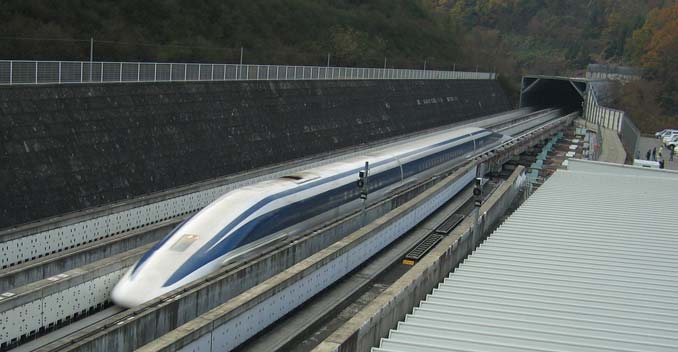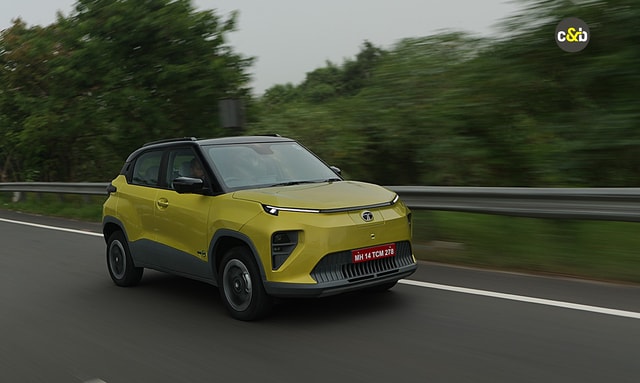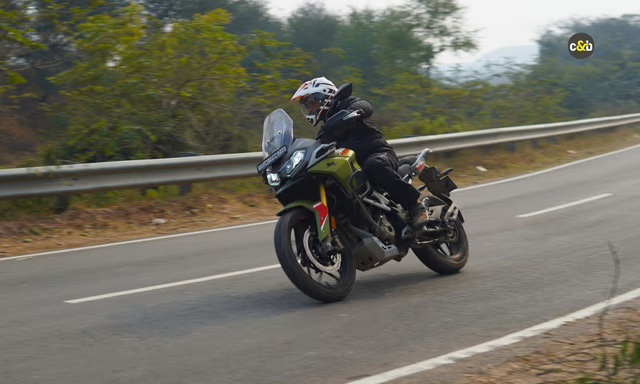Japan's Maglev Train Sets Speed Record by Going 603Km/h

The record saw the Maglev - short for magnetic levitation - cross the 600Km/h mark on a test-run in Yamanashi Prefecture just outside of Tokyo. This comes just days after it broke its previous 12-year-old record of 581km/h by going 590km/h.
The train had 49 Central Japan Railway employees for passengers who are said to be quite happy with the ride quality as it zipped past the 600Km/h mark and managed to stay at that speed for nearly 11 seconds. One must not that the Maglev is different from Japan's Shinkansen bullet train service; the Maglev is not only faster, but it also doesn't exactly travel on the track.
The Maglev hovers 10cm above the tracks, and is propelled by electrically charged magnets; the train starts off running on wheels until they're going fast enough for the magnets to kick in and create the lift. The power needed for levitation is typically not a large percentage of its overall energy consumption, thus making it a very practical option.
However, infrastructure costs will run in the billions. Hence, Japan intends to try and sell its high-speed technology overseas to help rake in some cash. Commercial operation of the Maglev service in Japan will begin by 2027.
How it works:
Japan's Maglev train uses an electrodynamic suspension (EDS) system that is based on the repelling force of magnets. It uses super-cooled, superconducting electromagnets, which can conduct electricity even after the power supply has been cut off.
However, this means the train must first roll on wheels till it attains lift-off speed of about 100Km/h. Japanese engineers say the wheels will come in handy in case of power failure and the consequent system shutdown.
Fact File:
1. Estimated construction cost for Tokyo to Nagoya stretch: $100 Billion
2. 80% of the Tokyo - Nagoya stretch expected to go through tunnels
3. Japan's bullet trains currently take 88 minutes to cover the 286Km-long stretch between Tokyo and Nagoya. Maglev will take 40 minutes
4. Less than a week back Maglev recorded a top-speed of 590Km/h, and broke its own 2003 record of 581Km/h
5. The fastest production car in the world - Hennessey Venom GT - can reach a top-speed of 435.31Km/h
6. Unofficial top-speed achieved by the BAR-Honda Formula 1 team with their 2005 car - 413Km/h
7. The fastest land animal - Cheetah - can attain a top-speed of 120Km/h
8. Theoretically, Maglev can circumnavigate Earth in just under 67 hours
9. Maglev trains don't use engines like the ones found in conventional trains
Latest News
 Bilal Firfiray | Mar 2, 2026New Mercedes-Benz V-Class Vs Toyota Vellfire: The Luxury Van ShowdownNew V-Class is here after a long hiatus. And it’s aiming squarely at the Toyota Vellfire in the luxury MPV space. So let us break down design, comfort, features, powertrains and real-world usability to help you choose the right one.5 mins read
Bilal Firfiray | Mar 2, 2026New Mercedes-Benz V-Class Vs Toyota Vellfire: The Luxury Van ShowdownNew V-Class is here after a long hiatus. And it’s aiming squarely at the Toyota Vellfire in the luxury MPV space. So let us break down design, comfort, features, powertrains and real-world usability to help you choose the right one.5 mins read Jafar Rizvi | Mar 2, 2026Yamaha XSR 155 Prices Hiked; New Colour IntroducedPrices for the XSR 155 now range between Rs 1.50 lakh and Rs 1.59 lakh (ex-showroom).1 min read
Jafar Rizvi | Mar 2, 2026Yamaha XSR 155 Prices Hiked; New Colour IntroducedPrices for the XSR 155 now range between Rs 1.50 lakh and Rs 1.59 lakh (ex-showroom).1 min read Jaiveer Mehra | Mar 2, 2026Auto Sales February 2026: Tata Retains Second Place Ahead Of Mahindra; Maruti Sales FlatHyundai and Kia reported their best ever wholesales numbers for February, while Toyota and Mahindra also reported sales growth.6 mins read
Jaiveer Mehra | Mar 2, 2026Auto Sales February 2026: Tata Retains Second Place Ahead Of Mahindra; Maruti Sales FlatHyundai and Kia reported their best ever wholesales numbers for February, while Toyota and Mahindra also reported sales growth.6 mins read Jafar Rizvi | Mar 2, 2026New Mercedes-Benz V-Class Launched In India At Rs 1.40 CroreThe luxury MPV makes a return to the Indian market after being discontinued in 2022.3 mins read
Jafar Rizvi | Mar 2, 2026New Mercedes-Benz V-Class Launched In India At Rs 1.40 CroreThe luxury MPV makes a return to the Indian market after being discontinued in 2022.3 mins read Jaiveer Mehra | Mar 1, 2026Mahindra XEV 9e Cineluxe Edition Launched At Rs 29.35 LakhNew special edition of the 9e electric SUV is based on the fully-loaded 9e Pack 3 but costs about Rs 1.15 lakh less.2 mins read
Jaiveer Mehra | Mar 1, 2026Mahindra XEV 9e Cineluxe Edition Launched At Rs 29.35 LakhNew special edition of the 9e electric SUV is based on the fully-loaded 9e Pack 3 but costs about Rs 1.15 lakh less.2 mins read Jaiveer Mehra | Mar 1, 2026New Mercedes-Benz V-Class Makes India Debut; Launch TomorrowUnlike the previous diesel-only V-class, the latest model will be offered with petrol and diesel engine options.1 min read
Jaiveer Mehra | Mar 1, 2026New Mercedes-Benz V-Class Makes India Debut; Launch TomorrowUnlike the previous diesel-only V-class, the latest model will be offered with petrol and diesel engine options.1 min read
 Bilal Firfiray | Feb 28, 2026Tata Punch EV Facelift Review: More Range, More Sense, Less MoneyThe Tata Punch EV facelift gets a bigger 40 kWh battery, faster 60 kW DC charging, improved thermal management, and better real-world range, and all of that at a lower introductory price. But does it become a more complete package now?6 mins read
Bilal Firfiray | Feb 28, 2026Tata Punch EV Facelift Review: More Range, More Sense, Less MoneyThe Tata Punch EV facelift gets a bigger 40 kWh battery, faster 60 kW DC charging, improved thermal management, and better real-world range, and all of that at a lower introductory price. But does it become a more complete package now?6 mins read Preetam Bora | Feb 24, 2026Hero Destini 110 Review: Simplicity, RefinedThe Hero Destini 110 is a no-nonsense commuter that is simple, comfortable and above all, fuel efficient. In 2026, when buyers are spoilt for choice, is it good enough to consider?1 min read
Preetam Bora | Feb 24, 2026Hero Destini 110 Review: Simplicity, RefinedThe Hero Destini 110 is a no-nonsense commuter that is simple, comfortable and above all, fuel efficient. In 2026, when buyers are spoilt for choice, is it good enough to consider?1 min read Preetam Bora | Feb 23, 2026TVS Apache RTX Road Test Review: Redefining the Entry-Level ADVAfter spending some time with the TVS Apache RTX in traffic, the daily commute, as well as on open highways, one thing becomes clear: the RTX is trying to redefine the entry-level ADV segment. But is it without fault?1 min read
Preetam Bora | Feb 23, 2026TVS Apache RTX Road Test Review: Redefining the Entry-Level ADVAfter spending some time with the TVS Apache RTX in traffic, the daily commute, as well as on open highways, one thing becomes clear: the RTX is trying to redefine the entry-level ADV segment. But is it without fault?1 min read Girish Karkera | Feb 20, 2026Road Test: 2025 VinFast VF7 AWD Sky InfinityFlagship all-electric SUV from the Vietnamese car maker gets most of the basics right.1 min read
Girish Karkera | Feb 20, 2026Road Test: 2025 VinFast VF7 AWD Sky InfinityFlagship all-electric SUV from the Vietnamese car maker gets most of the basics right.1 min read Jaiveer Mehra | Feb 18, 2026New BMW X3 30 Vs Mercedes-Benz GLC 300: Midsize Luxury SUV FaceoffWith the new X3 30, BMW has a direct competitor to the petrol GLC 300, but which is the luxury SUV for you?1 min read
Jaiveer Mehra | Feb 18, 2026New BMW X3 30 Vs Mercedes-Benz GLC 300: Midsize Luxury SUV FaceoffWith the new X3 30, BMW has a direct competitor to the petrol GLC 300, but which is the luxury SUV for you?1 min read























































































































